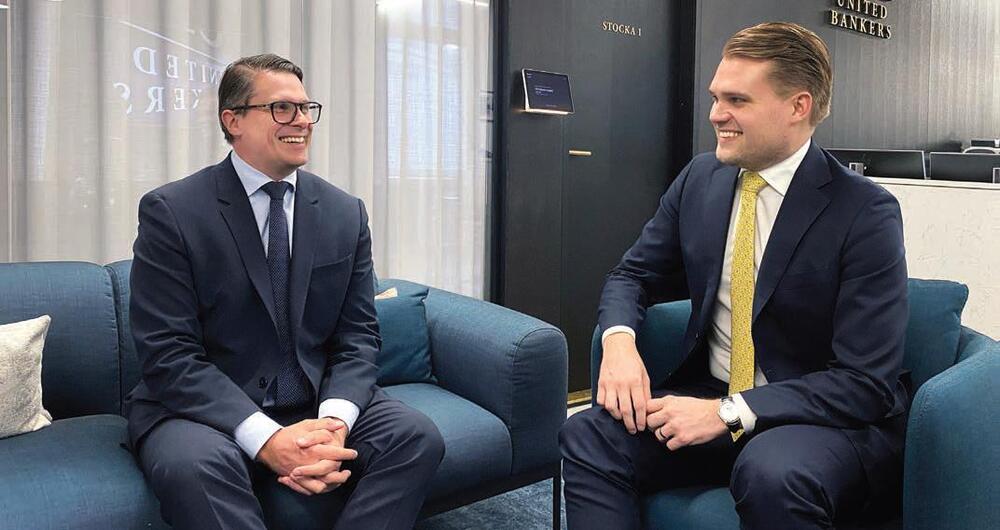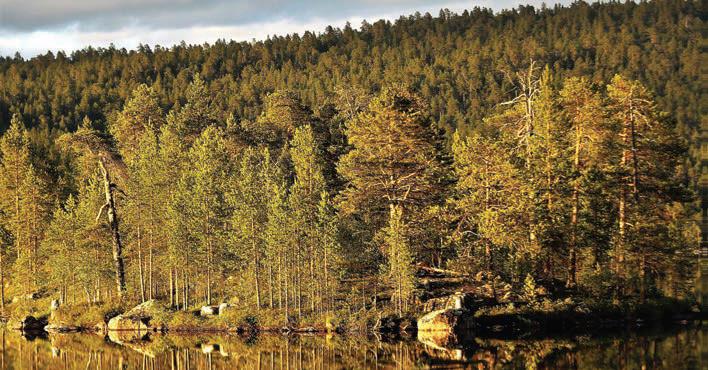Investing against climate change
29 March 2023Mike Jeffree reports on the new UB Forest Industry Green Growth private equity fund
If it can be made from fossils, there’s an increasing chance, thanks to latest scientific and technological advances, that it can be made using low carbon wood- and other bio-based materials. That’s the premise behind the creation of the UB Forest Industry Green Growth (FIGG) fund.
Officially launched at the end of January, Finland-based UB FIGG is a private equity fund. Its stated role is to support scaling up of businesses making these new wood-based products – everything from cutting edge new textiles, to bio-fuels.
It has been set up by United Bankers plc (UB), the Finnish wealth management and capital services operation. Its €4.4bn of assets under management include 140,000ha of forest, the fourth largest private holding in Finland. Consequently, it maintains, over the years, it has built up ‘deep expertise’ of the forestry sector.
“But we’ve reached the point where there is not much more forest in Finland available for UB to buy,” said UB FIGG managing partner Matti Lehtipuu. “That’s where the idea came from to set up a new fund instead to help increase the value of forests. It will do this through investment in non-listed companies in the cluster to grow manufacture of these value-added products.”
There are a number of reasons why the world will increasingly need this advanced bio-based product sector, he added. First and foremost there’s the global environmental crisis. The forest and bio-based industries are billed by UB FIGG as a key part of the solution in mitigating climate change, helping reduce CO2 emissions by making products to substitute fossil-based and energy intensive materials.
“For example, they can supply low carbon food packaging material to replace plastics, which are damaging ecosystems globally,” said Mr Lehtipuu.
By substituting finite materials and reducing the need for their extraction and by adding value to the forest, the bio-based supply sector can also slow or halt loss of biodiversity and habitat, says UB FIGG. Through application of new technologies and know-how, it maintains, it can additionally help ensure more efficient, less wasteful use of the forest and wider biomaterials resource.
“Globally we are still burning 50% of the forest raw material we process,” said Mr Lehtipuu. “And this is not a problem confined to the developing world. In industrialised countries, pulp mills, for instance, are still burning the lignin they separate from pulp in the production process as fuel.”
To highlight the ‘exciting’ prospects for making better use of bio-based material and reducing GHG emissions in the process, he pointed to the development by forest industries giant Stora Enso of a new ligninderived material to substitute graphite in electric car batteries.
“A modern electric car can contain 100kg of graphite, so this represents a huge opportunity”, said Mr Lehtipuu. “It could increase the value of lignin by a factor of 20.”
The scope of UB FIGG’s investment encompasses producers of textiles, including hygienic and specialty products that can replace cotton and synthetic materials. In biochemicals and biofuels, the focus will be on technologies that increase value-added use of wood and other bio raw materials to reduce burning directly for energy generation. It may also back producers of value-added biofuels, such as jet fuel.
Wood construction products that “tie in carbon for long periods” are another investment prospect, while in packaging UB FIGG is looking at production of bio-based rigid packaging and wood-based films to replace plastic, plus corrugated packaging that makes more efficient use of raw material than “conventional fibre-based” products.
“We will also invest in other businesses along the forest industry value chain, provided 50% of their turnover comes from the sector,” said Mr Lehtipuu. “That can include other manufacturers using forest or agri-fibre and businesses supporting more efficient transport, use and processing of the material, such as logistics, software and equipment providers.”
Another driver for development of these industries, he maintained, is demand for ‘greener’ products from increasingly climate crisis concerned consumers. There’s also the increasingly emissions-focused regulatory environment evolving to combat the crisis, with governments worldwide pushing the transition to a low carbon economy. That, of course, includes the EU with its Green Deal strategy to make the market carbon neutral by 2050.
Mr Lehtipuu said it is “no accident” that UB FIGG was launched in Finland.
“There are two key things we’re champions at. One is ice hockey, the other is forest management and forest products development and manufacture,” he said. “We have a long tradition in the sector and all the infrastructure and know-how. Our Nordic and European neighbours are also leaders in technical and new products development in this field.”
UB FIGG has established what it describes as a “world class management dream team”. Its team and investment committee comprises experts in private equity, investment banking, forest cluster investment and consultancy in forest products, energy and environmental sectors. There is also an advisory board of four, chaired by well-known timber industry figure Sampsa Auvinen, who has 25 years’ experience in the mechanical forest sector and is chairman of the European Woodworking Industries Confederation, CEI-Bois.
“Our blend of investment and forest sector experience makes UB FIGG unique,” said Mr Lehtipuu. “It also enables us to offer advice on projects, as well as funding and investment target businesses like to talk to us as we speak their language.”
Initially, 85% of UB FIGG investments will be targeted at Finland and the wider Nordic region, plus German-speaking countries and France, with specific potential also seen in Italy and the UK.
So far, it has raised €100m in investment commitments. Most of this capital is from Finland, with its anchor investors comprising state-owned Finnish Industry Investment Ltd (Tesi), pension insurance companies Veritas and Elo, the pension fund of the Finnish Broadcasting Company and the Sandvik Pension Fund.
The next phase will be to grow the fund further, with the engagement of the wider international investment community.
“The target for the total size of the fund is €300m, which we aim to reach in the next year and a half,” said UB FIGG partner Sakari Saarela.
The operation has also developed a “solid pipeline of potential initial investments”. The first are expected to come to fruition over the next six months.
UB FIGG stresses that it is not a venture capitalist and will not invest in early stage start-ups.
“We are a growth fund targeting businesses a bit further along in their development,” said Mr Lehtipuu. “They will have a technical readiness level of 6-7, with their pilot and demo phases already defined. We don’t want to fund initial tech development, but rather the scaling up of production to industrial level. We’ll invest €5-30m per portfolio company and typically seek a minority stake of 15-30%. We will also demand a board seat to influence company development and strategy.”
The fund will closely scrutinise and provide full transparency on the sustainability of investment prospects.
“First of all their raw material has to be PEFC or FSC-certified and we are a signatory of Operating Principles for Impact Management – the first fund in Finland to belong to that global standard,” said Mr Saarela. “We’ve also promised investors to report on the total CO2 impact of the fund’s investments and the tonnage of fossil material they help substitute. We also, of course, comply with the EU’s Sustainable Finance Disclosures Regulation.”
UB FIGG is a closed-end fund for professional investors, with a 10-year lifetime and extension option of 24 months. Its target net return is 15%, which it describes as typical for a private equity fund and ‘conservative’.
“We’re saying that our internal modelling has a 5% margin for error and on a gross level we’re looking more at about 20%,” said Mr Saarela.
Both Mr Lehtipuu and Mr Saarela are optimistic about the funds prospects.
“We’re extremely positive,” said Mr Saarela. “There hasn’t been a specialist player like us in this field before and we’ve had a lot of interest from entrepreneurs and industrial companies in the forest and bio-based materials sector. They now have an investment fund focused on the same things as they are. And on the investor side, in today’s tough environment to raise €100m in Finland for a Helsinki-based first vintage fund is a major success.”
Mr Lehtipuu said he was excited by UB FIGG’s opportunities.
“There are no other funds with a similar scope and we can make a significant contribution to the development of this important industry cluster,” he said.
Looking to the future, beyond the 10-year term of the initial fund, he saw it as a rolling project.
“Typically in this business we would start a second, then a third and fourth fund and that will likely happen in this case,” he said.

